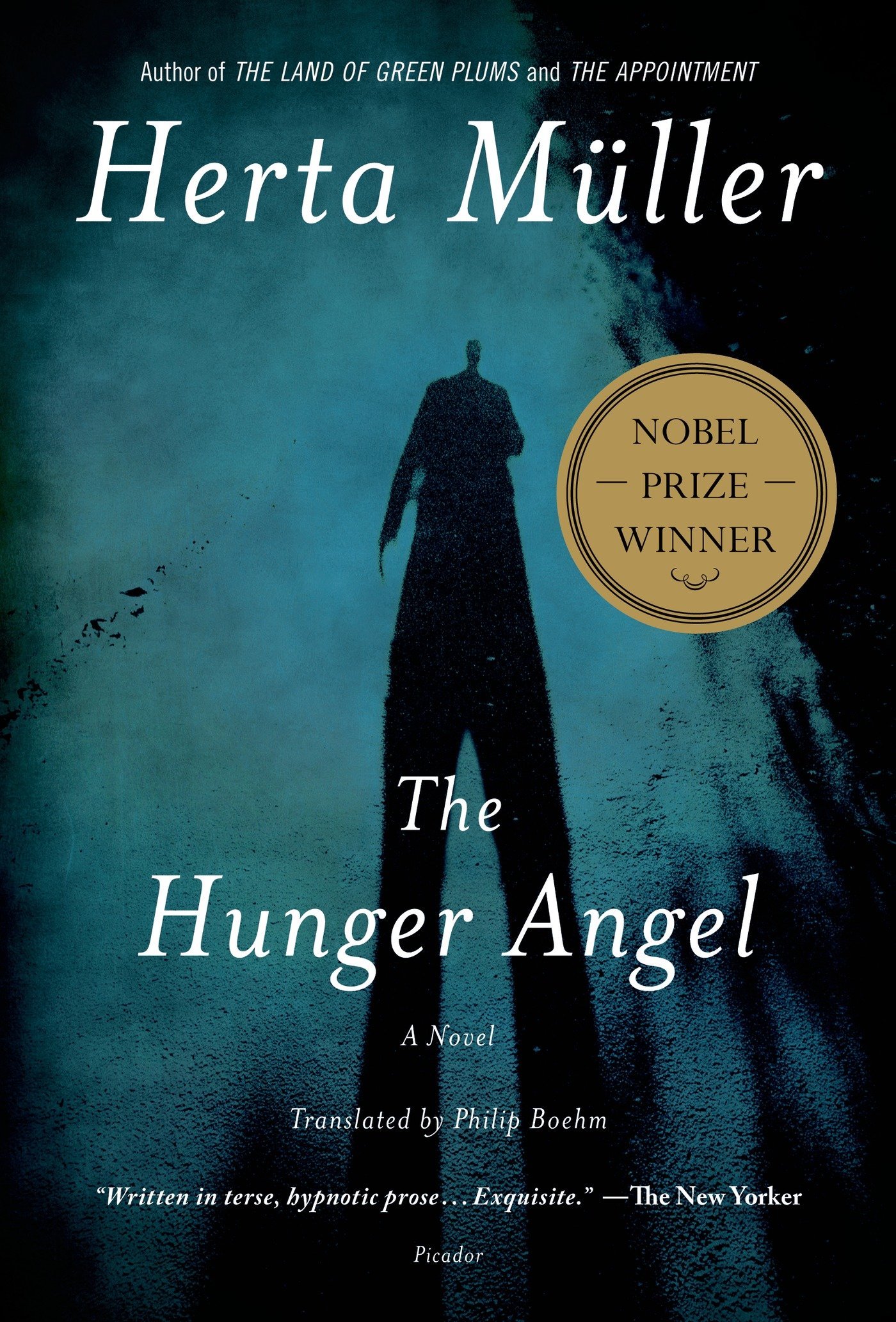The Hunger Angel by Herta Müller
 After I read The Land of Green Plums a few years ago, Herta Müller joined a short list of authors whose work I want to read all of. I am not the sort of reader who methodically works through an oeuvre; I crave different voices. But this list includes Virginia Woolf, Toni Morrison, and Mavis Gallant. (It used to include Angela Carter; I adore her short fiction, but actually found trying to read her novels like trying to eat an entire chocolate mousse cake.) Müller's fiction is poetic and harrowing and sheds light on the country my family comes from. For me, she is a must.For my third installment of Women In Translation Month, I tackled The Hunger Angel. This novel tells the story of Leo Auberg, a young German man in Romania deported to a labor camp in Russia in January 1945. I was surprised to learn that this happened: all Germans living in Romania and from the ages of 17-45 were forced to "rebuild" the Soviet Union. Indeed, as Müller explains in her Afterword, this was something shameful that Germans in Romania only discussed among themselves, if they discussed it at all. (Müller emigrated to West Germany after being persecuted by Ceausescu's secret police.)The Hunger Angel meditates on objects. Life in a gulag is tedious, so in lieu of a tight narrative arc, the first two-thirds of the book move laterally from things like cement and coal to yellow sand and firs. There's a weirdly loving chapter about a kind of shovel known as "the heart-shovel," which, by virtue of its design, allows Leo to forget himself as he works in ways that other tools or tasks don't.And, of course, as the title implies, there's a food problem. With just one piece of bread a day and two bowls of cabbage soup, and no mid-day meal, the hunger angel emerges an antagonist who skews how prisoners perceive their world and how they behave. But memories of food from childhood buoy Leo and his prison-mates. One day, every summer, his mother would take him to the Café Martini where he could gorge himself on sweets:
After I read The Land of Green Plums a few years ago, Herta Müller joined a short list of authors whose work I want to read all of. I am not the sort of reader who methodically works through an oeuvre; I crave different voices. But this list includes Virginia Woolf, Toni Morrison, and Mavis Gallant. (It used to include Angela Carter; I adore her short fiction, but actually found trying to read her novels like trying to eat an entire chocolate mousse cake.) Müller's fiction is poetic and harrowing and sheds light on the country my family comes from. For me, she is a must.For my third installment of Women In Translation Month, I tackled The Hunger Angel. This novel tells the story of Leo Auberg, a young German man in Romania deported to a labor camp in Russia in January 1945. I was surprised to learn that this happened: all Germans living in Romania and from the ages of 17-45 were forced to "rebuild" the Soviet Union. Indeed, as Müller explains in her Afterword, this was something shameful that Germans in Romania only discussed among themselves, if they discussed it at all. (Müller emigrated to West Germany after being persecuted by Ceausescu's secret police.)The Hunger Angel meditates on objects. Life in a gulag is tedious, so in lieu of a tight narrative arc, the first two-thirds of the book move laterally from things like cement and coal to yellow sand and firs. There's a weirdly loving chapter about a kind of shovel known as "the heart-shovel," which, by virtue of its design, allows Leo to forget himself as he works in ways that other tools or tasks don't.And, of course, as the title implies, there's a food problem. With just one piece of bread a day and two bowls of cabbage soup, and no mid-day meal, the hunger angel emerges an antagonist who skews how prisoners perceive their world and how they behave. But memories of food from childhood buoy Leo and his prison-mates. One day, every summer, his mother would take him to the Café Martini where he could gorge himself on sweets:
We could choose among marizpan truffles, chocolate cake, savarins, cream cake, nutcake roll, Ischler tartlet, cream puffs, hazelnut crisps, rum cake, napoleons, nougat, and doboschtorte. And ice cream--strawberry ice cream in a silver dish or vanilla ice cream in a glass dish or chocolate ice cream in a porcelain bowl, always with whipped cream. And finally, if we were still able, sour-cherry cake with jelly.
As if being in a gulag is not challenging enough, Leo is in the closet. When men and women dance on Saturday nights (who knew they had dances, albeit sad dances, in gulags?), he remains off to the side. Men and women couple in the barracks; he does not. Though he observes: "Half-starved humans are really neither masculine nor feminine but genderless, like objects." Over the course of the novel, this meditation on objects also becomes a larger meditation on loneliness and longing and trying to stay alive.Leo has a poet's eye, and it is that vision, that attention to language, which makes reading this essential book bearable.